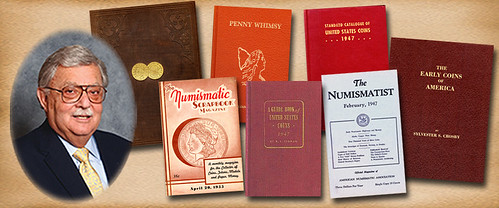
PREV ARTICLE
NEXT ARTICLE
FULL ISSUE
PREV FULL ISSUE
HARVEY STACK ON BOOKS AND THEIR VALUEIn his October 27, 2014 Stack's Bowers blog article, Harvey Stack begins a new
series on the value of numismatic literature. -Editor
 One question I hear quite often from beginning as well as advanced collectors is: "Why buy the book before the coin?". The question often comes from Internet collectors, who seem to think of that as the only source of information. Well, the Internet is good, but at the same time it can’t offer everything. I was brought up in a numismatic retail shop, run by my father and uncle, which was opened in a recession period. The goal during the 1930s at the first Stack's in New York City was developing a solid base of collectors that the store could serve. So they assembled a vast selection of inventory, with coins from ancient to modern, from the United States as well as the rest of the world, in gold, silver, copper and any other metal. They also assembled a library of reference books, auction catalogs, price lists and photographs. As dealers retired, Stack’s bought entire libraries. Likewise Stack’s would purchase collectors’ libraries, including those assembled by specialists. Printed information about coins and their history was not always found in the average coin shop, but Stack's tried to have as many books as they could among the items they offered for sale. During the 1930s and 1940s many of the now-famous collectors were building their cabinets. Each had a specialty or two or three, and when these specialized collections were sold, the auction catalogs became current reference books. Among printed references we had The Numismatist, and publications from the American Numismatic Society. Unfortunately this type of publications often carried very technical information about a series that interested the writer, and rarely had guidance for new collectors on how to build their own collections. One of the early standard references published during this period was the Standard Catalog of United States Coins. It was basically a tabulation of the dates and mints issued by the United States, and showed suggested retail prices. Most other publications had numismatic ads from dealers around the country, but no suggestions how to collect or what to look for. Some specialized references were more informative and descriptive, but many were either the inventories of collections being formed or were so highly specialized that they made it difficult to learn the basics. Auction catalogs of the period and of the decades before were the basic guideposts for the collector. The dealers or auctioneers who wrote the catalogs (some were extensively illustrated by drawings or early photographs) learned about the coins as they created the catalogs. They were also the experts on grading and other aspects of collecting. In this way the dealer/auctioneer became the teacher, passing this information on to other collectors. It was (and still is) often said, that one should not try to build an outstanding collection without guidance from books, dealers or fellow collectors. Coin clubs in and around large metropolitan areas became sources for information and these clubs grew rapidly as the information disseminated between members guided collectors in many areas including rarity, grading and more. To read the complete article, see:
THE BOOK BAZARREWayne Homren, Editor The Numismatic Bibliomania Society is a non-profit organization promoting numismatic literature. See our web site at coinbooks.org. To submit items for publication in The E-Sylum, write to the Editor at this address: whomren@gmail.com To subscribe go to: https://my.binhost.com/lists/listinfo/esylum All Rights Reserved. NBS Home Page Contact the NBS webmaster 
|